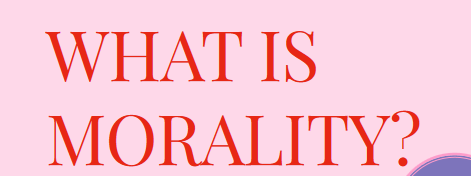What is Morality?
Posted_Date
Image

Body
MORALITY means Sila in the Pali Language. Morality denotes being virtuous and abstaining from evil actions, both physical and verbal. It also prescribes virtuous conduct (Carita Sila, စာရိတ္တသီလ)
In our Theravada Buddhism, Morality is based on abstention or avoidance. Morality, which is based on the observance of abstention decreed by the noble Buddha, is Caritta Sila, စာရိတ္တသီလ
Constant observance of the five precepts, etc. (Niece sila, နိစ္စသီလ) is fulfilled through abstentions.
By moral obligations, certain obligations must be fulfilled. In Buddhist ethics, certain moral obligations are incumbent on one, such as paying respects, welcoming, making obeisance, showing reverence and attending to elders who may be senior in age or in status, and one has to fulfil them.
Observing the precepts in abandoning sensual desire. The eight moral precepts consist of the observance of the following factors: -
(1) Abstaining from killing any living being,
(၁) သူ့အသက်သတ်ခြင်းမှ ရှောင်ကြဉ်ခြင်း
(2) Abstaining from taking what is not gives
(၂) ပိုင်ရှင်မပေးသော ပစ္စည်းဥစ္စာကို ခိုးယူခြင်းမှ ရှောင်ကြဉ်ခြင်း
(3) Abstaining from unchastity,
(၃) မမြတ်သောမေထုန်အကျင့်မှ ရှောင်ကြဉ်ခြင်း
(4) Abstaining from telling lies,
(၄) မဟုတ်မမှန်ရသာစကားတို့ကို ပြောဆိုခြင်းမှရှောင်ကြဉ်ခြင်း
(5) Abstaining from taking liquors and intoxicants, which can lead one to forgetfulness,
(၅) မူးယစ်မေ့လျော့စေတတ်သော သေရည်သေရက် မူးယစ်ဆေးဝါးများကို သုံးစွဲခြင်းမှ ရှောင်ကြဉ်ခြင်း
(6) Abstaining from taking food after mid-day,
(၆) နေ့လွဲ ညစာစားခြင်းမှ ရှောင်ကြဉ်ခြင်း
(7) Abstaining from dancing, singing, playing musical instruments, seeing shows, wearing flowers and using perfumes,
(၇) ကခုန်ခြင်း၊ သီဆိုခြင်း၊ တီးမှုတ်ခြင်းတို့ကို ကြည့်ရှုနားထောင်ခြင်းနှင့် ပန်းနံ့သာအမွှေးအကြိုင်များကို ပန်ဆင်လိမ်းကျံ တန်ဆာဆင်ခြင်းတို့မှ ရှောင်ကြဉ်ခြင်း
(8) Abstaining from using high and luxurious beds, seats, etc.
(၈) မြင့်သောနေရာ၊ မြတ်သောနေရာတို့ကို အသုံးပြုခြင်းတို့ကို ရှောင်ကြဉ်ခြင်းတို့ဖြစ်ကြသည်။
Morality is always used to prevent and avoid the unbeneficial Akusala Kamma. Two types of actions may be discerned: -
(1) Action which destroys the unbeneficial and produces the beneficial (Kusala Kamma)
(2) Action which destroys the beneficial and produces the unbeneficial (Akusala Kamma)
There are three kinds of action: -
(1) Physical Action (Kaya Kamma) (2) Verbal Action (Vici Kamma) (3) Mental Action (Mara Kamma)
Character is power in our human society. People are social animals, so it is said that when we live together in the form of society, we need a body of laws to keep peace and ensure justice for all members, without which it would be impossible for society
to function. We can say, therefore, that all of us are under the protection of the law. The noble Buddha speaks about a different form of protection, a far superior one. If we earnestly practice them. They are: -
(1) Hiri (ဟီရိ) = Shame at doing evil (Moral Shame, and မကောင်းမှုကိုပြုလုပ်ရန်ရှက်ခြင်း)
(2) Ottappu (ဩတ္တပ္ပ) = Fear of the results of doing evil (Moral Dread, မကောင်းမှုကိုပြုလုပ်ရန် ကြောက်ခြင်း
Hiri is moral shame or conscience. It wises out of an understanding of what is right or wrong, good or bad, and is developed through a constant application of moral vigilance.
A person who practices Hiri does not do anything rashly or without proper forethought but will always exercise precaution in all actions. Before doing anything, he wisely asks himself, “Is it right or wrong?” “Is it good or bad?”. If he finds it to be wrong or bad, he will not do it, no matter what the temptation. If, however, what he intends to do is right and good, he will make an effort to finish the task and will not give up.
Hiri can be compared to the feeling of being over the fire, which a person who loves cleanliness may experience when he sees something disgusting. He may not, for instance, put his hand into a trash bag full of stinking garbage if he can avoid it.
When he comes across a puddle of mud and dirt, he will stop aside to avoid getting himself and his clothes smudged.
Likewise, an individual who practices Hiri feels disgusted with all bad actions, physical, verbal and mental, and endeavours to avoid them as much as possible.
He does not do such things as stamping his feet before his parents, talking impolitely back at them, or having an unkind and unrespectful thought towards them, for he knows that such as bed and unbecoming of a good Buddhist and would make their parents very unhappy indeed.
Ottappa is moral dread or fear of doing something wrong or immoral. It is the result of a firm’s belief in the doctrine of Kamma, which states that a willful action brings about an appropriate consequence sooner or later.
An individual who has Ottappa is afraid to do evil deeds because he knows that they will bring evil results and unhappiness to himself and others. He will not, on the other hand, hesitate to do the right things, firmly believing that the consequences thereof will be pleasant and beneficial. Unfortunately, people tend to do just the opposite of what they should. They are brave to do evil but afraid to do good.
Ottappa can be compared to the fear of a poisonous snake.
Just as an individual avoids the snakebite, knowing that such is fatal, even so, an Ottappal person tries to avoid evil because he knows that consequences are painful. He does not do wrong things even when he is sure that he will not be caught, for he understands that the law of Kamma operates at all times and in all places. For this reason, also he is encouraged to do good even if no one else notices it or acknowledges his good deeds.
In my opinion, if people practice these two virtues, this world will, indeed, be well protected, and there will be less need for law. No evil deed will be committed even in secrecy. The world will thus be a very happy place for us all. Therefore, the two virtues (Hiri and Ottappa) are the highest ethics or morality for world peace forever.
Ref:
(1) A Dictionary of Buddhist Terms (Ministry of Religious Affairs, Myanmar, 2003)
(2) Basic Buddha Course By Phra Sunthorn Plamintr, PhD (Buddha Dhamma Meditation Centre, USA, 1987
Source- The Global New Light of Myanmar






